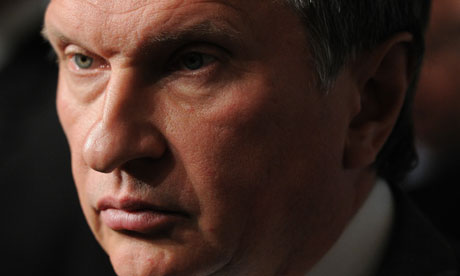
A force to be reckoned with: Igor Sechin, head of Russia's new energy commission. Photograph: Aleshkovsky Mitya/ Aleshkovsky Mitya/ITAR-TASS Photo/Corbis
"There are two things that determine the Russian economy", Oleg says. "The first is Putin's opinion and the second is the international price of oil and gas."
With the oil price dipping close to $90 a barrel last week, Russia said it would set aside $40bn (?25.6bn) to cushion the country against a global slowdown. But the "r" in the Bric nations looks increasingly vulnerable, just as Vladimir Putin retakes the presidency and tightens state control of the economy.
Oleg's wife Veronika says: "It's not an economy at all. It's only a cash machine for them." By "them", she means a small clan of former spies around Putin, known as the siloviki, or men of power.
Oleg and Veronika are in their late twenties. They live in a small apartment in St Petersburg and run a modest computer business. They are a success story, two of Russia's new, reasonably prosperous middle class. And they are leaving Russia.
"We don't want to go," Veronika says. "Who wants to leave their country? But life becomes more and more difficult. The whole place is corrupt. From the Kremlin to the traffic police".
"Just when you think you're making some money," Oleg adds, " another demand comes from somewhere. It's just graft. Unless you have friends in the elite, you have to pay."
Oleg and Veronika are just two of the many young people in Russia considering leaving, citing the corrupt nature of Russia's institutions, from police to the judicial system, to the protection rackets that operate with the complicity of the law enforcement bodies, to the various business authorities and, as Veronika says, all the way up to the Kremlin.
Russia is now No 120 in the World Bank's "Ease of Doing Business" survey. "Corruption is now the entire system," a banker in Moscow says.
Russia's population is in drastic decline. Much of this is due to emigration, nearly all of which is of the younger and smarter elements of the population. The rest is caused by a falling life expectancy and birth rate.
Up to Putin's recent re-election to the presidency, however, if you were one of the few who made outlandish amounts of money and commanded influence within the siloviki elites, life has been good in the past 10 years.
Following a decade of spectacular growth fuelled by high energy prices, Russia is the third-richest in the world in terms of cash reserves and its GDP has grown tenfold. But since Putin's re-election, the signs are that, even for the very richest ? at least, those outside Putin's key lieutenants ? a new economic era is dawning in Russia.
Last Monday, Putin appointed the greyest of his ?minences grises, Igor Sechin, to another all-powerful position in the energy sector. Like Putin, Sechin is a former KGB officer, and is known in Russia as Darth Vader and "the scariest man on Earth". Before Putin was re-elected, Sechin was deputy prime minister, but a month ago Putin appointed him head of the state's energy company Rosneft instead, and last week confirmed rumours of Sechin's ascent by making him the chief of a new energy commission.
Sechin will also take over Rosneftegaz, the successor to the soviet ministry of oil and gas. As such, he now has powers over and above the energy ministry and even prime minister Dmitry Medvedev in determining Russia's "new strategy", as the Kremlin is calling it. This strategy is to "reprivatise" Russia's energy assets ? in other words, to put them in the hands of established Putin loyalists.
The energy minister, Alexander Novak, has threatened to resign over the issue, as has one of Putin's seven deputy prime ministers, Arkady Dvorkovich. Sechin's new powers have also upset many of Russia's tycoons. A partner in AAR, a troika of Russian businessmen which has a crumbling joint venture with BP in Russia, said: "We now have to speed up the transfer of our assets abroad."
Sources close to Putin describe the president as frightened by the growth of what he calls "unguided democracy". As with the recent draconian law concerning public protest, so it is with the economy. "He is convulsively tightening his control over the economy through his old, KGB-origin allies in the siloviki clans," says one insider.
An officer in the economic department of the FSB, the KGB's successor organisation, says that, once energy has been firmly brought under the control of Putin's clan, "other mineral assets will be reprivatised". These could include aluminium and the largest producer by volume in the world, Rusal.
In the past 12 years, Putin has repeatedly stated he will "reinvigorate and diversify" the economy in Russia. But little has happened to back up his words. Now appears that the very opposite is happening. "The only way you can do business in Russia is by using mafiosi methods, kickbacks to officials," the head of a small Moscow oil company says.Unlike the other Bric countries, Russia is turning in on itself economically, the whole shaky system reliant on the international price of oil. A $117 oil price is necessary for Russia's budget to break even, but the current price is well below that and predicted to fall still further. Should Russia even be included as one of the Brics? As the American economist, Nouriel Roubini, says, Russia is "more sick than Bric".
sweet potato casserole safeway standing rib roast its a wonderful life its a wonderful life rex ryan yule log
No comments:
Post a Comment